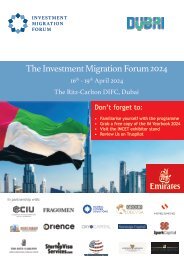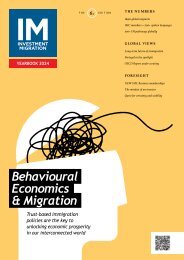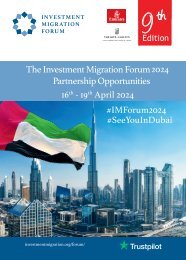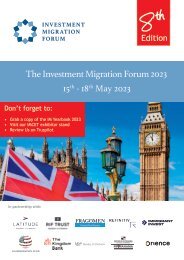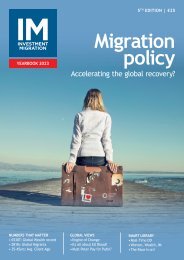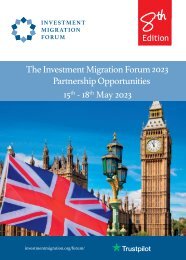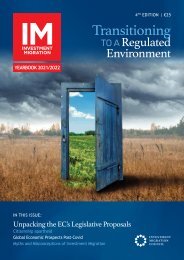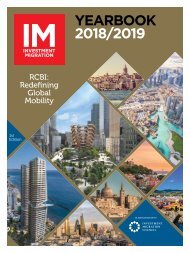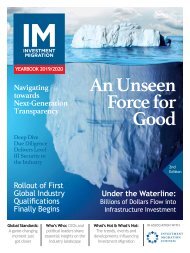IM Yearbook 2020/21
Born from the need for a global, credible, “go-to” publication, the 3rd IM Yearbook offers valuable access to a prime target audience of top industry influencers, decision makers, and the foremost referral network to the world’s most influential Investment Migration programmes: Government officials such as Heads of CIU’s, policy makers, academics, migration agents, law firms, wealth managers, financial advisors, real estate developers, and international firms involved in investment migration.
Born from the need for a global, credible, “go-to” publication, the 3rd IM Yearbook offers valuable access to a prime target audience of top industry influencers, decision makers, and the foremost referral network to the world’s most influential Investment Migration programmes: Government officials such as Heads of CIU’s, policy makers, academics, migration agents, law firms, wealth managers, financial advisors, real estate developers, and international firms involved in investment migration.
Create successful ePaper yourself
Turn your PDF publications into a flip-book with our unique Google optimized e-Paper software.
Interview with CHAD ELLSWORTH, Partner at Fragomen<br />
ENTREPRENEUR VISA<br />
PROGRAMMES WILL SEE<br />
EXPLOSIVE<br />
GROWTH<br />
Fragomen’s Chad Ellsworth believes that<br />
governments will implement a greater number of<br />
entrepreneur visa programmes to attract foreign<br />
innovators who can help with economic recovery<br />
and job creation in the post-Covid-19 era.<br />
We are seeing an increasing<br />
number of entrepreneurial visa<br />
programmes being launched.<br />
What’s driving this trend?<br />
In my opinion it’s a result of a growing<br />
global restrictionist immigration<br />
environment driven by populism and<br />
economic nationalism. It has been a<br />
fairly recent phenomenon, and it’s hard<br />
to pinpoint when it started. However,<br />
we have already noticed that after the<br />
2008 financial crisis and the economic<br />
downturn, many governments began to reorient<br />
their immigration systems towards<br />
attracting the “best and brightest” global<br />
talent and away from more traditional<br />
family or employer-based systems.<br />
Well-known receiving or in-bound<br />
immigration nations such as Canada,<br />
Australia, the UK and the US attempted<br />
to move away from traditional paths of<br />
immigration, to pivot towards a more<br />
merit-based system that seeks to attract<br />
the best and brightest talent including<br />
entrepreneurs. The big question that’s<br />
driving all of this is: how can governments<br />
transform immigration from being a<br />
potential economic burden to society in<br />
some instances into a tool for economic<br />
development? So, paradoxically, political<br />
pressure and nationalism are making<br />
programmes that have a demonstrated<br />
impact on the economy very popular, in<br />
particular in the current situation. For<br />
instance, in the US President Trump<br />
temporarily suspended the approval of<br />
certain green cards until end of <strong>2020</strong> to<br />
protect the American job market affected<br />
by the coronavirus. The EB-5 programme,<br />
however, was exempted from this order,<br />
likely because of its job-creating nature.<br />
The US, UK, Australia, New Zealand,<br />
France, Singapore, Portugal,<br />
Germany and many more countries<br />
offer entrepreneur programmes<br />
today. Which programmes are<br />
standing out to you and why?<br />
The French Talent Passport Programme<br />
has recently been popular with an average<br />
of more than 100 applicants per year,<br />
although not in the same volume that<br />
EB-5 has been popular, where there are<br />
thousands of applicants per year and<br />
major backlogs as a result given the 10,000-<br />
annual limit. Still, it has gained traction.<br />
The UK also runs the Start-up<br />
and Innovator programmes geared<br />
towards highly skilled graduates and<br />
established entrepreneurs respectively.<br />
The programmes are aimed at those<br />
with new and innovative business<br />
ideas and a relatively modest level<br />
of capital investment is required.<br />
There is also an attractive incubatorbased<br />
programme in Canada, although<br />
to my knowledge it has not been used as<br />
widely as some of the European ones. I<br />
think we are going to see a lot more of<br />
these programmes in the near future.<br />
Take the UK’s Tier 1 (Investor) Visa,<br />
which requires a passive investment of £2<br />
million in UK companies. Now, if there are<br />
approximately 300-400 applicants a year,<br />
that’s really a drop in the bucket if you<br />
look at the total size of the UK economy.<br />
It doesn’t make a huge difference into<br />
the overall budget of the UK. So, I think<br />
programmes that are tied towards job<br />
creation, business formation as well as<br />
attracting and retaining highly skilled<br />
professionals are easier programmes<br />
to support, and the UK government<br />
is considering further changes in this<br />
area post Brexit, in addition to recent<br />
changes expanding the scope of its Global<br />
Talent visa programme. We clearly see<br />
that programmes that are tied to real<br />
economic activity and job creation tend<br />
to have support on both sides of the<br />
political spectrum despite an overall<br />
global restrictionist environment.<br />
While from a policy perspective<br />
these programmes might be very<br />
attractive for governments, why<br />
should they be on the radar of startup<br />
founders and young graduates?<br />
It really comes down to price point. These<br />
programmes have a lower investment<br />
threshold than the more traditional<br />
investment migration programmes.<br />
For instance, in France the investment<br />
can be as low as €30,000. Therefore, it’s<br />
attractive to recent graduates who might<br />
have a great business plan and some seed<br />
money or investors within their family<br />
but might not have the $2 million, $1<br />
million or even $500,000 required for<br />
the citizenship or other residency routes.<br />
So, these new programmes are really<br />
geared towards younger immigrants<br />
and recent university graduates.<br />
Do you believe that entrepreneur<br />
programmes will eventually overtake<br />
the importance of traditional<br />
investment migration programmes<br />
and perhaps replace them?<br />
I don’t think we are trending that way yet.<br />
Unfortunately, the application process<br />
around a lot of these start-up visas has<br />
yet to align to today’s business practices.<br />
68<br />
Investment Migration <strong>Yearbook</strong> 2O2O/2O<strong>21</strong>




